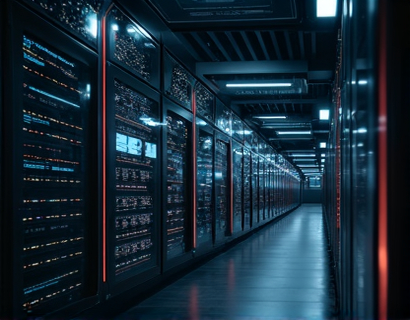Autonomous AI Agents: Maximizing Efficiency and Streamlining Processes Across Blockchains and Technologies for Businesses
In the rapidly evolving digital landscape, businesses are constantly seeking innovative solutions to enhance efficiency, reduce costs, and gain a competitive edge. One of the most transformative technologies emerging to address these needs is the integration of Autonomous AI Agents across multiple blockchains and technologies. These AI agents are designed to operate seamlessly, automating complex tasks and optimizing workflows with advanced AI solutions. This article delves into the capabilities, benefits, and practical applications of Autonomous AI Agents, providing businesses with insights on how to leverage these technologies to streamline operations and maximize productivity.
Understanding Autonomous AI Agents
Autonomous AI Agents are sophisticated software entities that can perform tasks with minimal human intervention. These agents are equipped with machine learning algorithms and natural language processing capabilities, enabling them to understand, interpret, and act on complex data sets. The key feature of these agents is their ability to operate across different blockchain platforms and technological ecosystems, ensuring a unified and efficient approach to business processes.
The term "autonomous" refers to the self-governing nature of these AI agents. They can make decisions, learn from experiences, and adapt to new inputs without the need for constant human oversight. This autonomy is crucial in environments where data is vast, varied, and constantly changing, such as in the realm of blockchain technology. By integrating Autonomous AI Agents, businesses can achieve a higher level of operational efficiency and responsiveness.
Benefits of Autonomous AI Agents in Business
The adoption of Autonomous AI Agents offers numerous benefits for businesses across various industries. One of the most significant advantages is the substantial reduction in operational costs. By automating routine and repetitive tasks, businesses can allocate human resources to more strategic and value-added activities. This not only reduces labor costs but also minimizes the risk of human error, leading to higher accuracy and reliability in processes.
Another key benefit is the enhanced efficiency and speed of operations. Autonomous AI Agents can process and analyze large volumes of data in real-time, enabling businesses to make informed decisions quickly. This is particularly valuable in fast-paced markets where timely insights can mean the difference between success and failure. Additionally, the ability to operate across multiple blockchains and technologies ensures that businesses can leverage the strengths of different platforms, creating a more robust and flexible infrastructure.
Security is also a critical aspect where Autonomous AI Agents excel. Blockchain technology is renowned for its security features, and when combined with AI, the system becomes even more resilient against threats. AI agents can detect and respond to anomalies in real-time, enhancing the overall security posture of the business. This is especially important for industries dealing with sensitive data, such as finance, healthcare, and supply chain management.
Integration Across Blockchains and Technologies
One of the most compelling features of Autonomous AI Agents is their ability to integrate seamlessly across different blockchain platforms and technological ecosystems. Traditional systems often struggle with interoperability, leading to siloed operations and inefficiencies. Autonomous AI Agents bridge this gap by acting as a unified interface that can communicate and interact with various blockchain networks and legacy systems.
For instance, in a supply chain scenario, an AI agent can monitor and manage transactions across multiple blockchains, ensuring transparency and traceability at every step. It can automate the verification of product authenticity, track inventory levels, and facilitate smart contract executions without the need for manual intervention. This level of integration not only streamlines processes but also builds trust among all parties involved.
Moreover, the flexibility of Autonomous AI Agents allows businesses to adapt to new technologies as they emerge. Whether it's integrating with emerging blockchain platforms like Polkadot or Cosmos, or incorporating other advanced technologies such as IoT and edge computing, these agents can be configured to work harmoniously. This adaptability ensures that businesses remain at the forefront of technological advancements, maintaining a competitive advantage.
Case Studies and Practical Applications
To better understand the practical applications of Autonomous AI Agents, let's explore a few case studies from different industries.
In the finance sector, a major bank implemented Autonomous AI Agents to manage cross-border payments. The agents were programmed to interact with multiple blockchain networks, including SWIFT and R3's Corda, to facilitate real-time transactions. This not only reduced the settlement time from days to minutes but also significantly lowered transaction costs. The AI agents continuously monitored the transactions, ensuring compliance with regulatory requirements and detecting any fraudulent activities.
In the healthcare industry, a leading hospital utilized Autonomous AI Agents to streamline patient data management. The agents integrated data from various sources, including electronic health records, wearable devices, and external data feeds, to provide a comprehensive view of patient health. This enabled doctors to make more informed decisions and improve patient outcomes. The AI agents also automated the process of updating patient records, reducing the administrative burden on staff and minimizing errors.
In the manufacturing sector, a global automotive company deployed Autonomous AI Agents to optimize its supply chain. The agents monitored inventory levels, demand forecasts, and supplier performance across multiple blockchains and internal systems. By automating the procurement process and adjusting orders in real-time based on demand, the company reduced inventory costs and improved production efficiency. The AI agents also detected potential supply chain disruptions and proposed alternative solutions, ensuring continuity.
Implementing Autonomous AI Agents: Best Practices
For businesses looking to implement Autonomous AI Agents, several best practices can ensure a successful deployment.
First, it's essential to define clear objectives and use cases. Identify the specific processes that can benefit most from automation and AI integration. Conduct a thorough analysis of the current workflows to pinpoint areas of inefficiency and potential bottlenecks. This will help in designing AI agents that address the most critical pain points.
Second, invest in a robust infrastructure. Autonomous AI Agents require powerful computing resources and a secure network to function effectively. Ensure that your IT infrastructure can support the computational demands of AI algorithms and the data transfer requirements of blockchain interactions. Cloud solutions can be particularly beneficial in providing scalable and secure resources.
Third, focus on data quality and governance. AI agents rely heavily on high-quality data to make accurate decisions. Implement robust data management practices, including data cleaning, validation, and regular audits. Establish clear data governance policies to ensure compliance with regulatory requirements and maintain data integrity.
Fourth, adopt a gradual and iterative approach. Start with pilot projects to test the capabilities of AI agents in controlled environments. Monitor the performance, gather feedback, and make necessary adjustments before scaling up. This approach helps in identifying and addressing potential issues early on, reducing the risk of large-scale failures.
Finally, foster a culture of continuous learning and improvement. AI agents should be designed to learn from their experiences and adapt to new scenarios. Encourage collaboration between human teams and AI agents, leveraging the strengths of both to drive innovation and efficiency.
Challenges and Considerations
While the benefits of Autonomous AI Agents are substantial, there are also challenges and considerations that businesses must address.
One of the primary concerns is the complexity of integration. Integrating AI agents across multiple blockchain platforms and technologies requires expertise in both AI and blockchain domains. Businesses may need to invest in training their IT teams or partner with specialized consultants to ensure a smooth integration process.
Another challenge is the issue of trust and transparency. AI agents operate based on algorithms and data, which can sometimes be opaque. To build trust, businesses should implement explainable AI (XAI) techniques that provide insights into the decision-making process of AI agents. This transparency is crucial, especially in regulated industries where accountability is paramount.
Privacy and security are also critical considerations. While AI agents enhance security, they also handle sensitive data, making them potential targets for cyberattacks. Implementing strong encryption, access controls, and regular security audits is essential to protect against threats.
Lastly, there is the issue of regulatory compliance. As AI and blockchain technologies evolve, regulatory frameworks are still catching up. Businesses must stay informed about relevant regulations and ensure that their AI agents comply with all legal requirements. This includes data protection laws, financial regulations, and industry-specific standards.
Future Trends and Innovations
The field of Autonomous AI Agents is rapidly evolving, with several exciting trends and innovations on the horizon.
One trend is the development of more sophisticated AI models, such as generative adversarial networks (GANs) and transformer-based models, which can enhance the capabilities of AI agents. These models can generate realistic data simulations, improve natural language understanding, and perform complex tasks with greater accuracy.
Another area of innovation is the integration of AI agents with edge computing. By processing data closer to the source, edge computing reduces latency and bandwidth usage, making AI agents more responsive and efficient. This is particularly beneficial for real-time applications in industries like manufacturing and IoT.
Blockchain technology itself is also advancing, with new consensus mechanisms and scalability solutions emerging. These improvements will make it easier for AI agents to interact with multiple blockchains seamlessly, further enhancing their utility.
Furthermore, the rise of decentralized AI (DAI) is an exciting development. DAI involves distributing AI models across a network of nodes, ensuring that no single entity has control over the entire system. This decentralized approach aligns well with the principles of blockchain and can enhance the security and resilience of AI agents.
Conclusion
Autonomous AI Agents represent a significant leap forward in business efficiency and process optimization. By seamlessly integrating across multiple blockchains and technologies, these agents automate complex tasks, reduce costs, and enhance security. The practical applications across various industries demonstrate their versatility and potential to drive innovation.
While there are challenges to consider, the benefits far outweigh the obstacles when implemented correctly. By following best practices, addressing concerns, and staying ahead of trends, businesses can harness the power of Autonomous AI Agents to achieve a competitive edge in the digital landscape. As the technology continues to evolve, the future looks promising for those who embrace this transformative approach.










































